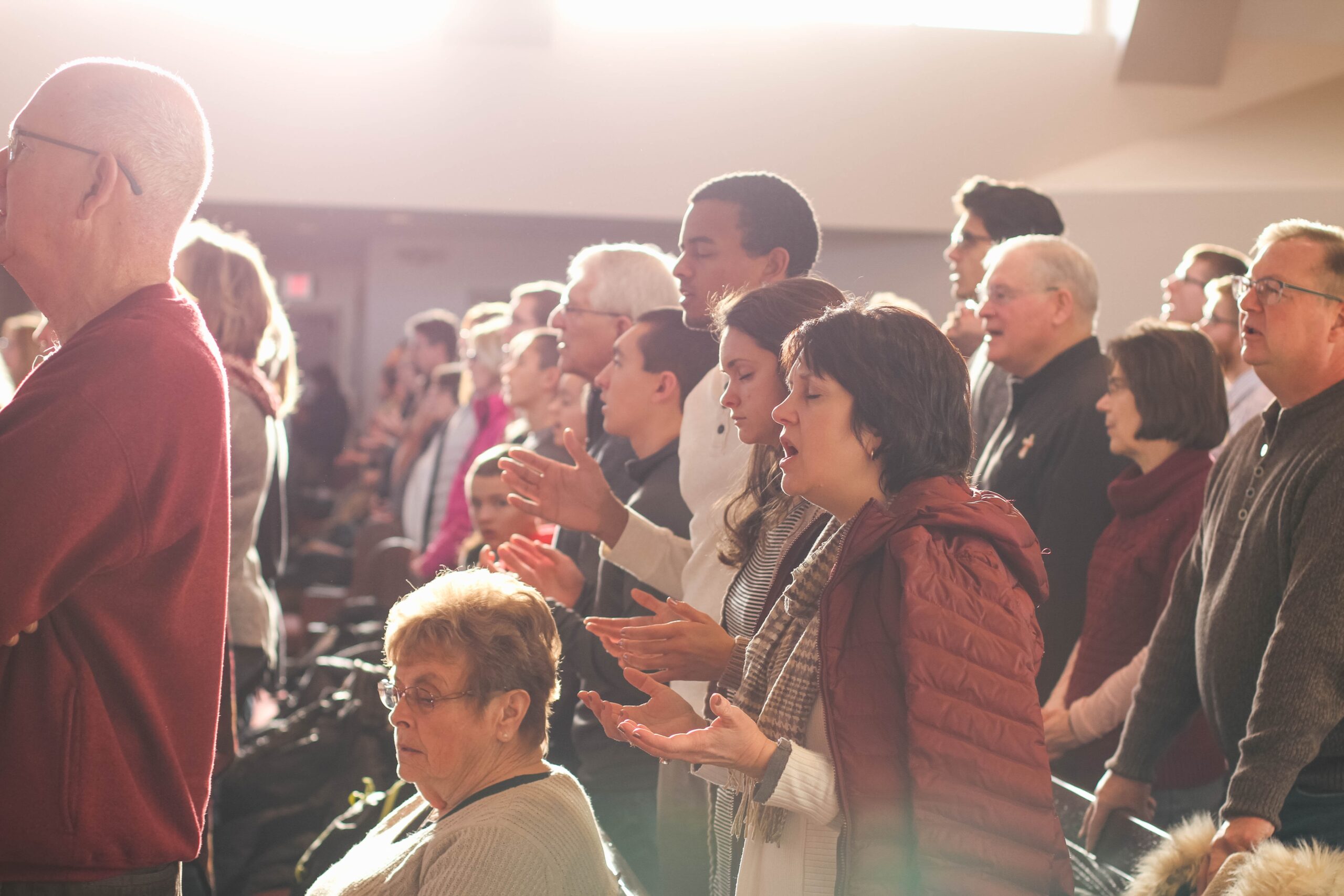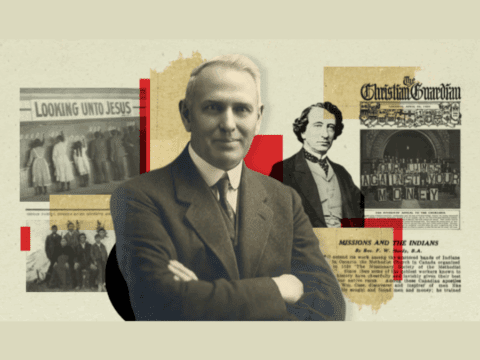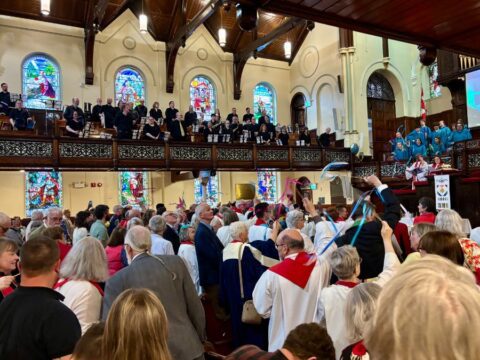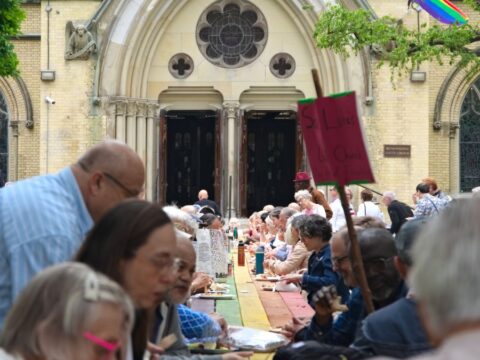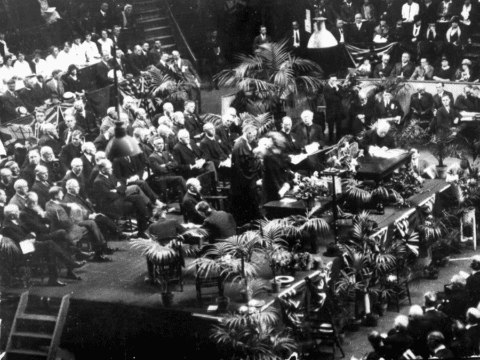Ten years ago, the church I served as a minister nearly disappeared right in front of my eyes. The first sign of crisis was the funerals. There was a week when we had three of them. Then, there were three in one day. Then, eight funerals in one week. In one year, we lost a hundred people who had once occupied a place in the sanctuary. As death took congregants, no one was replacing them. And among those who remained, morale was plummeting.
I worked harder and longer to compensate, but the congregation at Alderwood United in Toronto kept struggling. Board meetings lasted until almost midnight. A revolving door of visitors came, stayed a few weeks and left. Some blamed me for the turnover, some blamed the music, some blamed those parishioners who asked “outsiders” to switch seats and scolded the parents of squiggling children. Longtime church members posted glowing reports on Facebook about their visits to other churches but were silent about ours. Board members were under fire for every new initiative — or for not taking enough initiative.
I was not ready for any of this. When I became the minister of this church, I expected success. I would simply apply the knowledge and experience gleaned from years of postgraduate study, months of continuing education and thousands of dollars invested in books and scholarly journals. I had a doctorate in church growth, organizational behaviour and leadership. I was confident I had the right stuff to make things better.
But I was wrong. None of the tricks in my magic bag worked. I faced the grim inevitability that something I cared very much about was dying on my watch, and there was nothing I could do about it. It was no longer about faithfulness to God. It was just personally and professionally humiliating.
I’m far from the only United Church minister who’s found herself in this position. The denomination is closing about 60 congregations a year and is losing around 16 percent of its members every five years. My church could have become one of those statistics, but it didn’t. Instead, I watched as it came back to life more vibrant than ever. And not because of my own interventions, but through a renewed awareness of God and our collective vulnerability, and a focus on the kinds of practices that have nourished the church for centuries, especially confession and prayer. No magic formulas. Just grace emerging through weakness.
It all started in 2014 when a friend invited me to a retreat at a Mennonite church in a little Prairie town I’d never heard of. The church had grown outrageously, to 3,000 members. I was skeptical of any quick fixes, but I was too tired and fed up to be picky anymore, so I accepted the invitation, prepared to be underwhelmed. If I had nothing to gain, what did I have left to lose? I arrived at the church on a Friday afternoon and found 150 volunteers there, all welcoming, generous and eager to serve the 300 retreat participants.
The theme of the retreat was “Set Free.” At one point, organizers had us break off into groups of three. With the help of prompts printed on cards, we confessed our sins, our weaknesses, our mistakes and our fears to each other, and we prayed for inner healing. Personal sharing of emotional vulnerability is not usually my thing, so when my turn came I let someone else go instead. But the presence of two strangers who were also vulnerable and sworn to confidentiality was almost mystical. When I did speak, my hidden brokenness met the light before witnesses, and God stepped in with unspeakable love and relieved me, released my tears and dried them again. Something happened in those small groups that changed the trajectory of my life and ministry. I felt less self-reliant and less self-righteous than at any time before, and I felt infinitely, deeply, eternally loved.
Back at home, I sat down with our church’s leadership teams and found myself on the verge of tears, explaining how I had been disappointed, defensive and angry with them for a very long time, and that I didn’t want to be that kind of person anymore. To their surprise, and frankly mine, I began to name my fears and shortcomings. The confession was liberating not only for me, but also for our church. It created an openness and a freedom and prepared the way for rejuvenation to take hold.
It started small. I took up journal writing and practised listening prayer, where I let God direct the encounter rather than the other way around. Prayer was now a real conversation! Some congregants noticed a different vibe and joined me. One group started a weekly prayer meeting, and another organized monthly prayer summits. Together, we learned to pray more patiently. God began changing us, and as we changed, our church changed, too.
Energized, we held our own version of the “Set Free” retreat at our church in 2016. There were six sessions over two days, each with a presentation exploring forgiveness, freedom and inner healing. We talked about sin as the baggage we pick up one piece at a time throughout our lives. After most of the presentations, we broke out into groups of three, where we named our own baggage in confession and reminded each other of God’s promise of forgiveness.
The retreat’s impact was huge. One woman who had carried guilt and regrets to counsellors, psychiatrists and pastors for 40 years told me she felt physically lighter, as if 20 pounds had been lifted from her shoulders. Others, like me, were moved to peace, to joy, to tears. We now host these retreats every fall — this year will be our third — and online registrations begin to come months in advance.
In addition to the retreats, our church has been transformed by an enriched prayer life. I teach a new six-week course on how to pray and what prayer means. A third of our congregation now attends our monthly prayer summits, which last an hour and a half or more. The time flies. Our collective prayer begins with praise directed toward God, usually in song or psalms, followed by giving thanks. Gratitude engenders joy. We practise praying for and with one another in groups, in pairs, in threes or with journals alone.
The harvest is out of my hands, but I’m grateful for another chance, for the grace that has overwhelmed my regrets and my mistakes.
Prayer is no longer a spectator sport in our church. As we pray, we listen for God. We are becoming less self-centred as our prayers become more God-centred.
As a result of these new practices, our congregation is growing and more engaged than ever. We are more gentle and loving with each other. I’ve seen intentional forgiveness from those who held grudges, and self-restraint from those who formerly expressed unhelpful opinions. People have offered radical generosity to families in need. We are still far from perfect, but we are less jagged around the edges, less self-centred, less controlling.
Our operations are running more smoothly now, too. Board meetings that used to last until almost midnight end early, and perhaps as a result, we haven’t had any board resignations in over three years. A small budget shortfall we were expecting turned out to be a small surplus.
Our Sunday school has been reborn, and we now have an active youth ministry. And for the first time in 20 years, I am conducting more weddings and baptisms than funerals.
Individually, none of our transformations are especially significant. We are simply more humble in our confession, more earnest and patient in our prayer. But all together, we have changed our church, and the community has noticed. A man who once said he did not feel welcome with us came back to visit after an absence of 12 years. “I see you got an entirely new church,” he observed. “This isn’t the same one that was here.”
We still have challenges and problems, limitations and people issues. I sometimes wish we had a more able minister, faster committees, another $100,000. But we have been given another chance to do things differently.
I’m hopeful these days. Not triumphalist, but hopeful in the way of a farmer who sees the Divine work miracles through rain and sun on the seed and soil. The harvest is out of my hands, but I’m grateful for another chance, for the grace that has overwhelmed my regrets and my mistakes. I’ve lost faith in my own resourcefulness and found something less tangible and more compelling: the extraordinary work that God can do in a community that is open to it.
This story first appeared in the October 2018 issue of The United Church Observer with the title “Back to basics.”
For more of Broadview’s award-winning content, subscribe to the magazine today.

